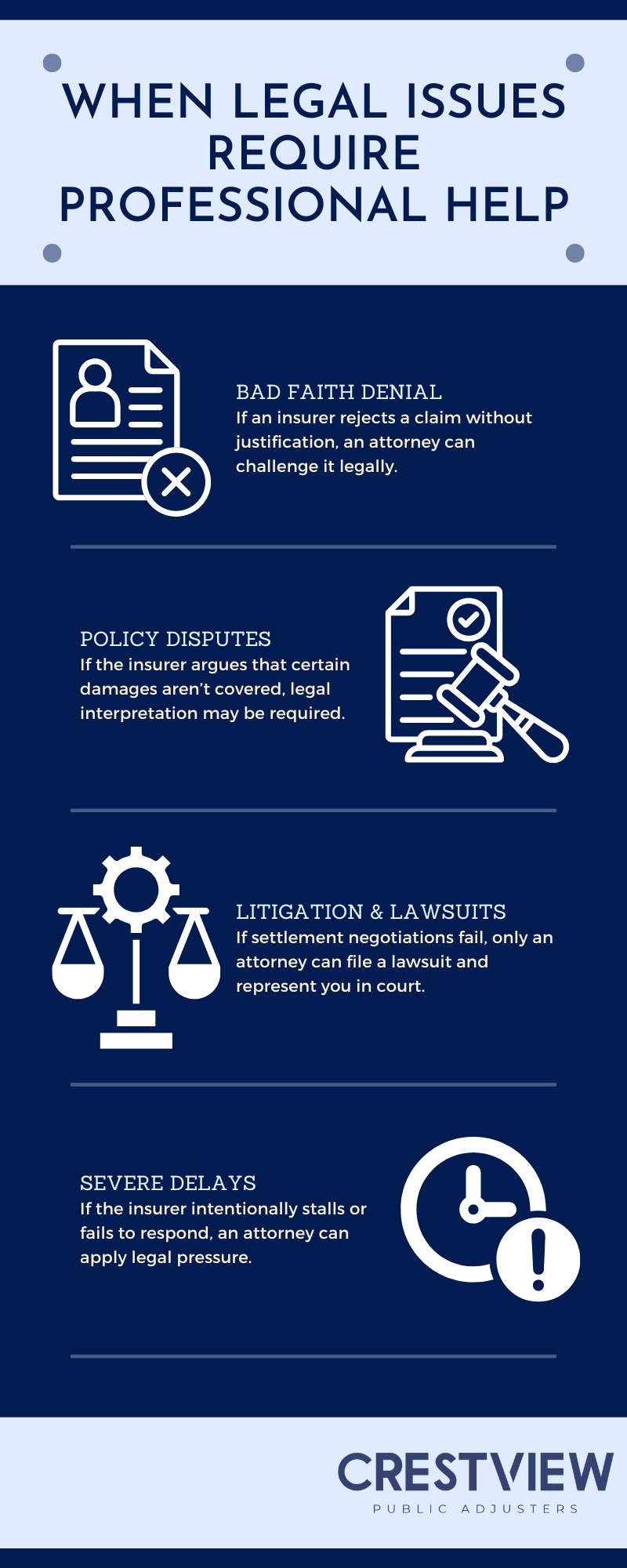Key Points:
- Public adjusters and attorneys serve different roles in insurance claims; knowing when to hire each is crucial.
- Public adjusters specialize in maximizing insurance payouts, while attorneys handle legal disputes and denied claims.
- Understanding your claim’s complexity and the insurer’s response helps determine the best professional to hire.
Both public adjusters and attorneys can help policyholders with insurance claims, but they serve different purposes. A public adjuster negotiates with the insurance company to maximize your payout, while an attorney steps in when there’s a legal dispute, such as a bad faith denial. If your claim is straightforward but undervalued, a public adjuster is often the faster and more cost-effective choice. However, if legal action is necessary, an attorney becomes essential.
What Does a Public Adjuster Do?
Insurance companies employ their own adjusters to assess claims, but they work for the insurer—not you. A public adjuster is a licensed professional who advocates for policyholders to ensure they receive the full settlement they deserve.
Filing a claim, the insurance company’s adjuster might downplay damages or overlook hidden costs. A public adjuster counters this by conducting an independent assessment, gathering evidence, and negotiating on your behalf.
How Public Adjusters Help Policyholders
- Damage Evaluation: Public adjusters thoroughly assess property damage and ensure all losses are documented.
- Policy Interpretation: They analyze your insurance policy to identify coverages the insurer may overlook.
- Claim Negotiation: They handle all negotiations, ensuring the insurer doesn’t underpay or delay payouts.
- Faster Resolutions: With their expertise, claims often settle quicker than when handled alone.
Many homeowners and business owners hire public adjusters for disasters like hurricanes, floods, fires, and burst pipes—situations where damages are extensive and the insurer’s payout may not be fair.
When Should You Hire an Attorney Instead?
While public adjusters are skilled in negotiating settlements, they do not provide legal representation. If your insurer outright denies a valid claim, engages in bad faith tactics, or refuses to negotiate, an attorney may be necessary.

Hiring an attorney can be expensive, as they often work on contingency, taking a percentage of the final settlement. For most non-disputed claims, a public adjuster remains the better first option.
How Much Does a Public Adjuster Cost vs an Attorney?
Cost is a major factor when deciding between a public adjuster and an attorney. Both typically work on a contingency basis, but their fees and structures differ.
Cost Breakdown
- Public Adjuster Fees: Usually 5-20% of the final claim payout, depending on claim size and complexity.
- Attorney Fees: Often 33-40% of the settlement, and if litigation is required, costs can rise significantly.
Cost Considerations
- Public adjusters are more affordable for standard claims since their fees are lower.
- Attorneys may be necessary if legal action is required, but their higher fees should be considered before hiring.
- Most claims don’t need an attorney, meaning a public adjuster can often resolve them faster and at a lower cost.
Can You Hire Both a Public Adjuster and an Attorney?
Yes, in some cases, both professionals can be involved. A public adjuster can maximize the settlement, while an attorney steps in only if legal disputes arise. However, hiring both at the same time is rarely necessary unless the claim is exceptionally complex.
When It Makes Sense to Use Both
- A public adjuster starts the process, handling negotiations and documentation.
- If the insurer refuses to cooperate, an attorney may be brought in to escalate the case legally.
- This approach helps keep costs lower since you only pay legal fees if absolutely necessary.
For most claims, starting with a public adjuster is the smarter choice before involving legal action.
Public Adjuster vs Attorney
Choosing between a public adjuster and an attorney depends on the situation. If your claim is being undervalued or delayed, a public adjuster is the best first step. They work to maximize your payout without the high legal fees. If your claim is wrongfully denied or involves legal disputes, an attorney is necessary. Understanding the differences ensures you hire the right professional for your needs.

Get the Settlement You Deserve with Crestview Public Adjusters
If your insurance claim is undervalued or taking too long, Crestview Public Adjusters is here to help. We fight for homeowners and businesses in Florida, New Jersey, and New York to ensure they receive the maximum payout possible. Don’t settle for less—contact Crestview Public Adjusters today and take control of your claim!

